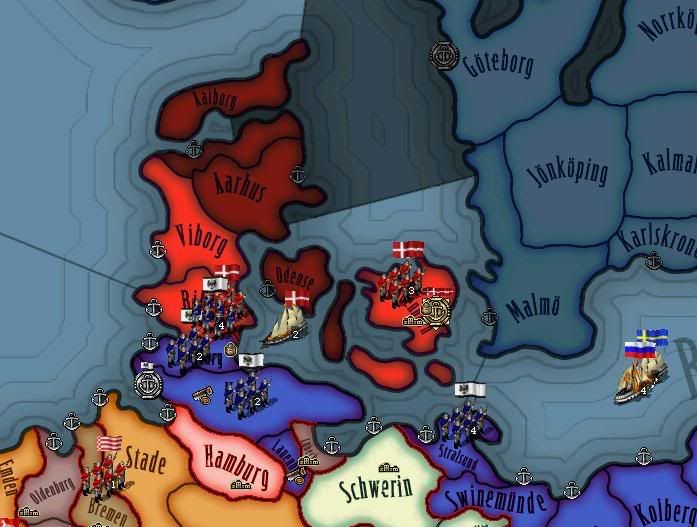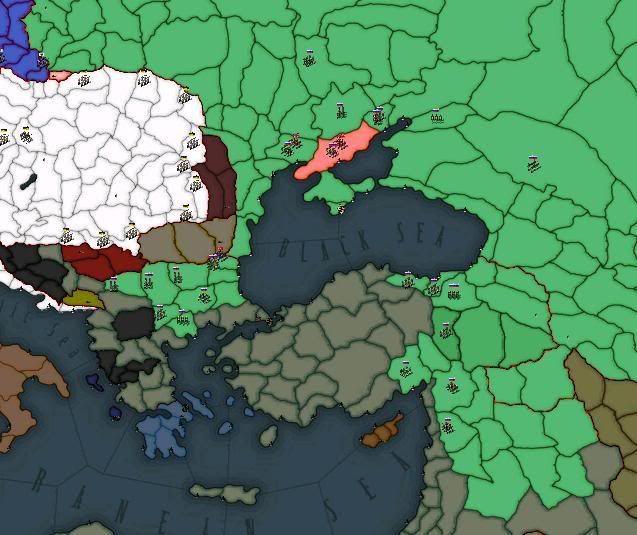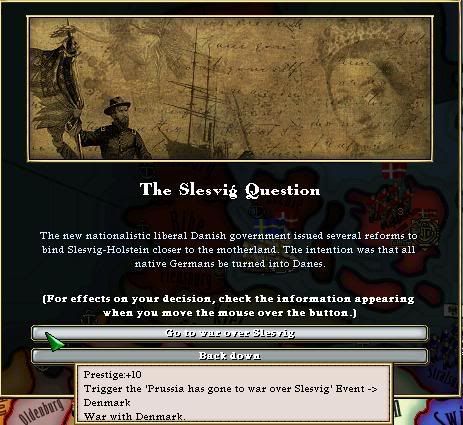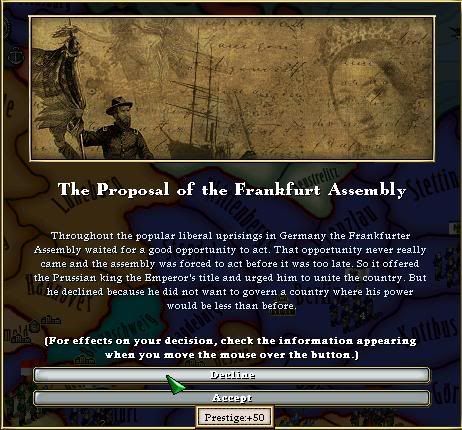Update 2: 1845 - 1860
In the following years, Prussia saw less revolts that expected, this had mainly to do that most military forces were sent to patrol through the country and this would prove effective, in 1850 the Liberal revolution finally ended. In 1846 Prussia singed a defensive pact with Russia, something the Kaiser wanted to do since he came in to the throne. The same year, because of the insults of their Monarch, Prussia declared colonial war on Burma but the Kaiser decided to take only the southern tip of the country since he felt that Prussia was not ready for a Colonial Empire. But even this wouldn't be realized because of the events that would follow, the troops send there were needed in the homeland and a peace treaty was signed, the term was to return to Status Quo.
In 1847, the Danish government wanted to make Holstein a part of their country by binding the two nations together, Prussia and Austria quickly responded with war.
Prussia was well prepared, the military forces quickly conquered Holstein and advanced towards Denmark, the Danes tried to cough Prussia in surprise by landing some troops in Stralsund but they were quickly repelled, than The Prussian forces meet the Danes in Flensburg, in a quick battle, the Prussians defeated the Danish forces and the Danish government, seeing the risks of the continuation of the war, decided to offer a peace proposal, after a few days of negotiating and less than 6 months of war, Prussia annexed Holstein and Flensburg. The Kaiser welcomed the new territories but felt that this matter didn't end with this war.

Economically Prussia was booming, many factories that were needed were build including a furniture factory in Rainland that supplied Prussia with the so much needed furniture for the middle class. By 1848, Prussia was 2nd greatest Industrial power and had all her experimental rail network upgraded to early railroads including the new territories of Holstein and Flensburg.
On May 18, 1848, when the Prussian Kaiser, Friedrich Wilhelm IV, influenced by the 1848 revolutions, gave support to a National Assembly to discuss German unification. The Frankfurt Parliament was the first attempt to create a unified Germany. It was given the room to operate but the parliament was weak as it had no legal power (which was in the hands of the German Confederation). Furthermore the publics strong support of the monarchy prevented a permanent backing of the revolutionary forces. So, Kaiser Friedrich Wilhelm IV declined.
During those years, the population was unhappy because of the fact that the nation was a monarchy, so, Kaiser Friedrich Wilhelm IV ordered some political reforms and changed the constitution, he gave the parliament more power and Prussia was declared a constitutional monarchy.
In 1853, the world saw a big conflict, the Russian Tzar had enough with the Ottomans and declared war on them, the Tzar wanted the Balkans but the great powers feared that Russia might become to powerful, The UK, France and Prussia discussed the situation, France and the UK declared war on Russia but Prussia did not, it cost them some prestige but the Kaiser decided that a war against the bear would be too costly, mainly because Prussia had a large border with them and the Russians had already too much troops at the border. The Russian Tzar, seeing this opportunity, offered an alliance to the Kaiser but the Kaiser was skeptic, he that decided that he would form that alliance, but it would be Invalid against France and the UK, so, Prussia was in an Alliance with Russia, but not in war. The Russians didn't need Prussians help anyway, the British and the French tried some landings in the area around Sevastopol but couldn't beat the Russian troops, who, easily walked upon the rebellion plagued Ottoman Empire.

Finlay, Peace was made, the Russians demanded only Adana but were humiliated through the eyes of the world losing much prestige. The war against the UK was continuing through and the UK made several successful landings in area around Sevastopol and in Finland. The war ended in 1859, 6 years after the start of the conflict, it was a return to Status Quo but this war cost both sides much, especially Russia,

 ).
).

 ).
).




